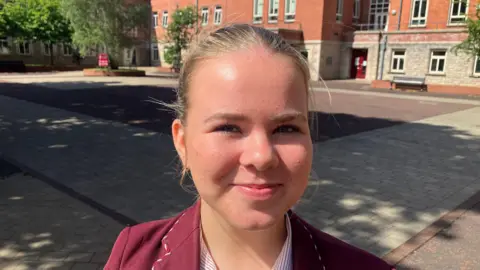- Style
US Open forecast: Saturday weather updates for third round
时间:2010-12-5 17:23:32 作者:Forex 来源:International 查看: 评论:0内容摘要:Work on the final phase of the scheme is due to begin after Mr Fenton has displayed at Chelsea later this month.Work on the final phase of the scheme is due to begin after Mr Fenton has displayed at Chelsea later this month.
Paul Geary, senior representative at the plant for the Unite union, said the infrastructure for electric vehicles did not exist, and he urged the government to help save the plant."It's not unique to Luton," he said. "Luton's just the first card in the pack.

"If the infrastructure's not there we'll see the likes of Toyata, Nissan and Jaguar Land Rover falling by the wayside."The government have to step up... We need to all work together, and closing plants ain't the way."Sarah Owen, Labour MP for Luton North,

to close the factory during Prime Minister's Questions on 11 December.Stellantis, which also owns Citroen, Peugeot and Fiat, previously said rules imposed to speed up the transition to electric vehicles in the UK had partly driven its decision.

Labour's manifesto set a target of 2030 to end the sale of new petrol and diesel cars.
Manufacturers are currently required to sell a certain percentage of electric vehicles ahead of the that ban, with quotas increasing each year.Locals had prompted an investigation into the practicality of the current 30mph speed limit on Broad Street, High Street and Twyning Street in Bromyard, and whether it was better to introduce a lower speed limit.
There were no objections from the fire and ambulance services, the Road Haulage Association, the Freight Transport Association, or the "locality steward" at the council's public realm contractor, Balfour Beatty.Herefordshire Council rejected the idea during a consultation last year but only published it this month.
Ward councillor for Bromyard West, Clare Davies, backed the idea. However, councillor Peter Stoddart, of neighbouring Bromyard Bringsty, opposed it.Both he and the town council questioned what would be achieved by introducing a 20mph speed limit "given that the speeds were already very low", Herefordshire Council's decision document explained.
- 最近更新
- 2025-07-07 04:37:27Scoreboard. Tennis recruits TikTok as it chases the next wave of fans
- 2025-07-07 04:37:27Wales 'confident' of hosting Euro 2028 opening ceremony
- 2025-07-07 04:37:27As Punjabi hip-hoppers go global, bhangra outfits get a makeover
- 2025-07-07 04:37:27Fire alarm saves museum store room from blaze
- 2025-07-07 04:37:27Trump's tariffs 'not going away' as deadline for deals loom, top adviser says
- 2025-07-07 04:37:27The new investment case for pubs
- 2025-07-07 04:37:27Thousands evacuate from fast-moving fires in Canada
- 2025-07-07 04:37:27Swamp Notes podcast. Trump considers war in Iran
- 热门排行
- 2025-07-07 04:37:272-Tier Multi-Purpose Bathroom Under Sink Organizers (2-pack)$25$40Save $15with coupon
- 2025-07-07 04:37:27More than 1,000 migrants cross Channel in a day
- 2025-07-07 04:37:27qualify you for low-mileage discounts
- 2025-07-07 04:37:27Arts centre has £285k of improvements approved
- 2025-07-07 04:37:27our guide to guest drivers and car insurance
- 2025-07-07 04:37:27Berlin aims to more than double army reserves in response to Russia’s invasion of Ukraine
- 2025-07-07 04:37:27Queen Size Sheet Set $21$42Save $21with coupon
- 2025-07-07 04:37:27Pimco bets on long-term Japanese debt in ‘dislocated’ market
- 友情链接
- World Bank slashes global economic outlook as trade tensions continue Can Real Madrid erase the memories of failed defences at Club World Cup? Caitlin Clark points, stats: Indiana Fever star shines in WNBA return Kevin Costner, 70, shares his candid thoughts on retirement, reveals if he has anythi… 28 feminine and flirty balletcore fashion to try for yourself The 100-year-old trick to my favorite burger of all time (every bite is perfect!) Pakistan legend Wasim Akram praises his statue amid social flak Democrats wooing Musk after the Trump breakup is US plutocracy at its best Video Duration 24 minutes 01 seconds play-arrow24:01 How has Bitcoin performed since Trump took office? Save big on these podiatrist-approved Clarks sandals — just in time for summer Trump clears path for Nippon Steel investment in US Steel, so long as it fits the gov… Lone passenger survives as Air India plane crash in Ahmedabad kills 241 Photos: Third night of anti-immigrant violence in Northern Ireland town Leonard Lauder, billionaire heir to cosmetics empire, dies at 92 Sat 4:10 PM EDTFDSWISTL36-34MIL38-33 Dodger Stadium singer confirms she performed national anthem in Spanish to protest IC… My surprising 1-ingredient upgrade for a better tuna sandwich Photos: Trump sends Marines and more National Guard members to Los Angeles Video Duration 27 minutes 55 seconds play-arrow27:55 Mapping Israel’s military campaign in the occupied West Bank Sparkling Champagne and Strawberries Will Smith turned down Christopher Nolan’s ‘Inception’ offer because ‘I didn’t get it… Musk commits to stay as Tesla CEO for another five years Are white farmers in South Africa under threat? UN demands probe as Israeli forces kill more people near aid site in Gaza A-Z Animals ArticlesThis once-eradicated larva is staging a comeback ‘Open prison’: The forced labour driving India’s $5 trillion economy dream Leonard Lauder, billionaire heir to cosmetics empire, dies at 92 10 new dinner recipes with 5 ingredients or less
